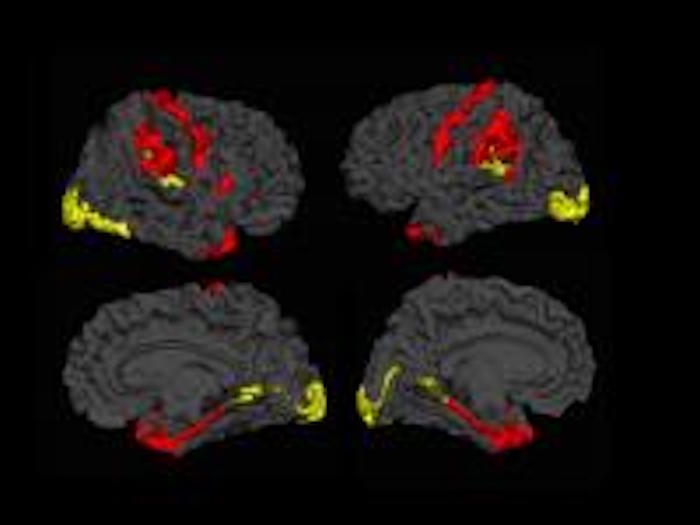A new study using specialized MRI scans provides evidence that patients with schizophrenia actually possess the ability to reorganize and battle the mental illness . This is the first time that imaging scans have been employed to demonstrate the ability of the brain to actually reverse the devastating effects of schizophrenia.
Although schizophrenia is typically associated with a global reduction in the volume of brain tissue, recent evidence indicates that there is actually a small increase in tissue and volume that may occur in specific areas of the brain.
The study, “Dynamic cerebral reorganization in the pathophysiology of schizophrenia: a MRI-derived cortical thickness study,” was published online in Psychology Medicine.

Dynamic cerebral reorganization in the pathophysiology of schizophrenia: An MRI-derived cortical thickness study. Credit: Lena Palaniyappan
The researchers studied 98 patients with schizophrenia and compared them to 83 patients without schizophrenia. Using Magnetic Resonance Imaging (MRI) and a specialized approach known as covariance analysis, researchers noted an increase in the gray matter tissue in the brains of those patients with schizophrenia . This was difficult to demonstrate in the past, researchers say, due to a wide distribution of perceived increases in brain volume in such patients.
Dr. Lena Palaniyappan, Medical Director at the Prevention & Early Intervention Program for Psychoses (PEPP) at London Health Sciences Centre (LHSC) states that there is a widely perceived notion that we cannot cure people with severe mental illnesses such as schizophrenia. “Even the state-of-art frontline treatments aim merely for a reduction rather than a reversal of the cognitive and functional deficits caused by the illness,” said Palaniyappan.
The rationale for this approach comes from a long-standing belief that schizophrenia is a degenerative illness, with damage resulting early in brain development. “Our results highlight that despite the severity of tissue damage, the brain of a patient with schizophrenia is constantly attempting to reorganize itself, possibly to rescue itself or limit the damage,” offered Palaniyappan.
The researchers plan to further characterize the evolution of this brain tissue reorganization process by doing serial scans of individual patients with early schizophrenia and study the effect of this reorganization on their recovery.
One limitation of the study may be the lack of ability to control for medication-related effects on brain remodeling or regeneration. This effect, in some respects, might be considered uniform among all participants with schizophrenia, since the majority are likely receiving various anti-psychotic medications that exert varying effects on different areas of the brain subject to reorganization and regeneration.
“These findings are important not only because of their novelty and the rigor of the study, but because they point the way to the development of targeted treatments that potentially could better address some of the core pathology in schizophrenia,” explains Dr. Jeffrey Reiss, site chief, psychiatry, LHSC. “Brain plasticity and the development of related therapies would contribute to a new optimism in an illness that was 100 years ago described as premature dementia for its seemingly progressive deterioration.”
“Dr. Palaniyappan and his colleagues have opened new avenues of research into our understanding of schizophrenia,” explains Dr. Paul Links, chair/chief, psychiatry, LHSC. “Their findings may lead us to be able to harness the brain’s own compensatory changes in the face of this illness and improve recovery. We are excited that Dr. Palaniyappan will be continuing this important clinical research here in London with his international colleagues.”
REFERENCE
Shuixia Guo, Lena Palaniyappan, Peter F. Liddle, Jianfeng Feng (2016). Dynamic Cerebral Reorganisation in the Pathophysiology of Schizophrenia: A MRI derived Cortical Thickness Study Psychological Medicine doi:10.1017/S0033291716000994
Story from Forbes News: http://www.forbes.com/sites/robertglatter/2016/05/30/brain-heal-thyself-new-insight-into-schizophrenia/#48b8981b732a
Published: MAY 30, 2016 @ 06:00 AM